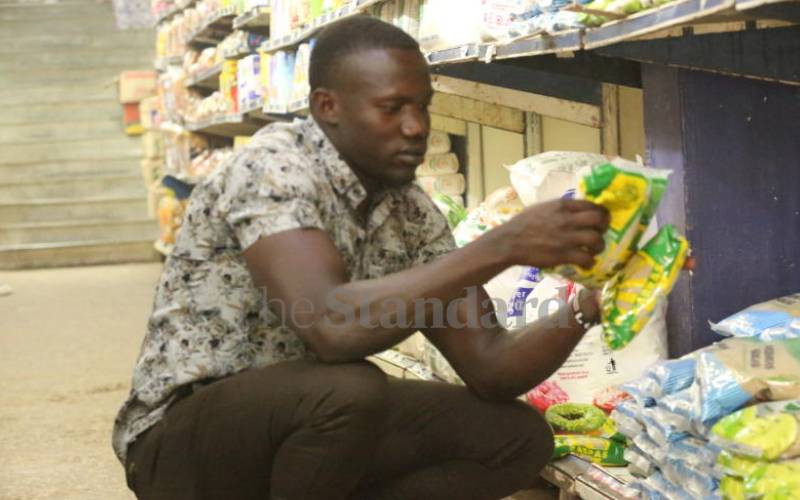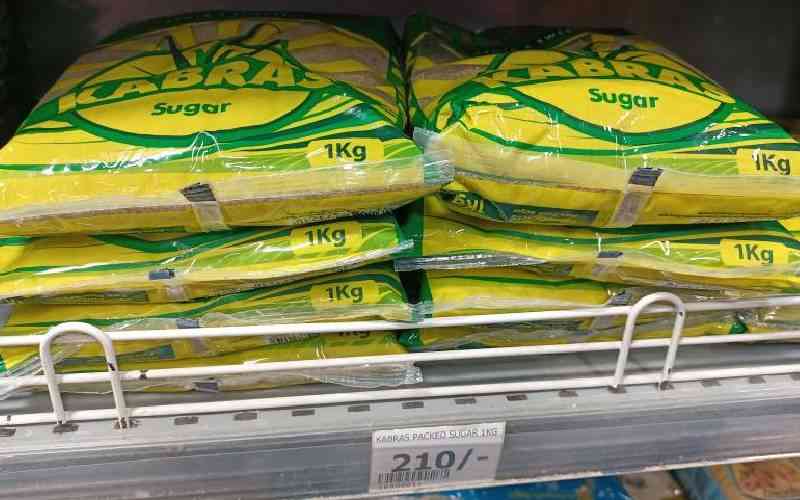Kenya will continue facing sugar shortage, with consumers paying more for the product. This is despite the two factories closed in the last two months reopening. The reopening of West Kenya and Kibos has only reduced the deficit the county has been facing since October this year by 22 per cent.
Daily sugar production currently stand at about 1,500 tonnes against a consumption of 2,000 tonnes. A statement on situation of sugar industry released by the Ministry of Agriculture, Livestock and Fisheries recently said the 51 per cent deficit has only reduced by 22 per cent.
In October, Mumias Sugar Company, West Kenya, Kibos and Soin sugar firms were closed for maintenance leading to a deficit of 51 per cent. The remaining seven operational factories - Chemelil, Sony Sugar, Nzoia Sugar, Butali, Transmara, Sukari and Muhoroni Sugar have on average not exceeded 1,500 tonnes daily.
Agriculture Principal Sicily Kariuki said West Kenya and Kibos which have been out of operation since October resumed operations last week. But, their reopening may not guarantee price reprieve to consumers as a kilo retails between Sh115 and Sh125, depending on the brand.
“I am happy to inform the public that West Kenya and Kibos Sugar Company have now resumed production, a development that is expected to bolster daily sugar production by more than 400 additional tonnes. “Ex-factory” sugar prices have now stabilised and are now ranging between Sh4,200 and Sh4,000 per (50kg) bag compared to the price of Sh5,300 per (50kg) bag, in October 2014,” said Ms Kariuki.
“We may not guarantee that the new production will contribute to price reduction in the short term but may be when all the closed sugar mills are reopened. Also, demand and supply will determine how the market will behave.”
But despite the high prices on the market, sugar farmers still swallow the bitter pill as the cane prices have been slashed by nearly half. Some farmers complain that some millers and crooks underweigh their cane, intentionally to pay them less.
“Last season, I got more than Sh290,000 for the first harvest and I expected more than 350,000 this season because the expenses were less and had more cane but was surprised to get only Sh90,000 from the factory,” said Alice Khisa, a farmer in Misikhu area, Bungoma County.
Mumias produces 28 per cent of the total sugar output in the country, West Kenya at 14 per cent, Kibos eight per cent and Soin at one per cent. The remaining 49 per cent is produced by the State-owned factories. Ms Kariuki said the Government managed to stabilise the market through imports from the countries within the Common Market for Eastern and Southern Africa (Comesa) bloc.
Industrial use
In the last two months, 19,290 tonnes of sugar was imported into the country compared to 24,394 tonnes imported the same period in 2013. Kenya is currently producing 70 per cent of the total domestic sugar requirement, making the country a net importer of the commodity. Total sugar requirement in the country is about 800,000 tonnes, consisting of 650,000 tonnes of table sugar and 150,000 tonnes for industrial use.
On average, 2,000 tonnes of table sugar is consumed daily. Kenya as a signatory to the Comesa Free Trade Agreement enjoys an extended 12 month moratorium under the Comesa safeguards, is obligated to allow importation of up to 350,000 tonnes of sugar duty free from partner states. “Any sugar imports above this quantity are subjected to a 5 percent duty. Kenya is yet to exceed the above stated quantity,” she added.
Ms Kariuki assured that the Government has employed a sound surveillance system to insulate the local market against unethical trade practices by unscrupulous traders. She said an inter-agency unit comprising of the Kenya Ports Authority, Public Health, Agriculture, Fisheries and Food Authority, Kenya Bureau of Statistics, the Police Service and Kenya Revenue Authority will tame illicit sugar trade.
 The Standard Group Plc is a
multi-media organization with investments in media platforms spanning newspaper
print operations, television, radio broadcasting, digital and online services. The
Standard Group is recognized as a leading multi-media house in Kenya with a key
influence in matters of national and international interest.
The Standard Group Plc is a
multi-media organization with investments in media platforms spanning newspaper
print operations, television, radio broadcasting, digital and online services. The
Standard Group is recognized as a leading multi-media house in Kenya with a key
influence in matters of national and international interest.
 The Standard Group Plc is a
multi-media organization with investments in media platforms spanning newspaper
print operations, television, radio broadcasting, digital and online services. The
Standard Group is recognized as a leading multi-media house in Kenya with a key
influence in matters of national and international interest.
The Standard Group Plc is a
multi-media organization with investments in media platforms spanning newspaper
print operations, television, radio broadcasting, digital and online services. The
Standard Group is recognized as a leading multi-media house in Kenya with a key
influence in matters of national and international interest.







